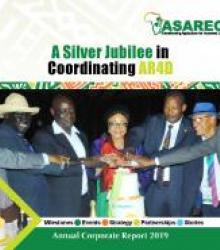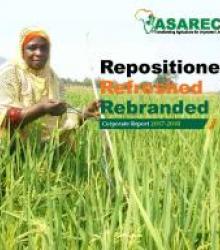| Title | Author | Asbract |
|---|---|---|
| Ten years after the world food summit: fostering political will for food security | ASARECA | Ten years after the world food summit: fostering political will for food security |
| Eradicating poverty and hunger: towards a coherent policy agenda | ASARECA | Eradicating poverty and hunger: towards a coherent policy agenda |
| Agricultural growth and economic development: a view throughthe globalization lens. Part II | ASARECA | Agricultural growth and economic development: a view through the globalization lens. Part II |
| Implications of substantially increased development Aid: the case of Uganda | ASARECA | Implications of substantially increased development Aid: the case of Uganda |
| Framework for African Agricultural Productivity Endorsed. Part I | ASARECA | Framework for African Agricultural Productivity Endorsed. Part I |
| Framework for African Agricultural Productivity Endorsed. Part I | ASARECA | Framework for African Agricultural Productivity Endorsed. Part I |
| Framework for African Agricultural Productivity Endorsed. Part II | ASARECA | Framework for African Agricultural Productivity Endorsed. Part II |
| Biotechnology: economic farm income gains from commercialization of BT cotton and maize in the COMESA region | ASARECA | Biotechnology: economic farm income gains from commercialization of BT cotton and maize in the COMESA region |
| Framework for African Agricultural Productivity Endorsed. Part I | ASARECA | Framework for African Agricultural Productivity Endorsed. Part I |
| Biotechnology: toewards a regional policy on GMO crops among COMESA/ASARECA countries | ASARECA | Biotechnology: towards a regional policy on GMO crops among COMESA/ASARECA countries |
| Biotechnology: toewards a regional policy on GMO crops among COMESA/ASARECA countries | ASARECA | |
| Agricultural production and soil nutrient mining in Africa: implications for resource conservantion and policy development | ASARECA | |
| Farmer Field Schools: A boon or bust for agricultural extension in Africa? | ASARECA | Farmer Field Schools: A boon or bust for agricultural extension in Africa? |
| Gender and development: bridging thegap between research and action | ASARECA | Gender and development: bridging the gap between research and action |
| The role of non-GM biotechnology in developing world agriculture | ASARECA | In the intense debates around the applications of modern biological research to agriculture and food production, genetic modification (GM techniques)—and the novel crops that result from their application—tends to attract the lion’s share of public attention. This is despite the fact that such research offers a range of other tools and techniques that do not involve genetic modification, and yet can still make major contributions to agriculture. One result of the disproportionate focus on GM crops is that policymakers in the developing world often lack adequate information on the nature and potential use of non-GM biotechnologies. This briefing seeks to help fill this information gap by summarizing the characteristics of the most common non-GM biotechnologies that are being developed and applied to crop improvement in the developing world. It focuses on four types of non-GM biotechnology: tissue culture, molecular markers, diagnostic techniques and microbial products. |
Search
Search entail eLibrary collection
Copyright © 2025. All rights reserved.
Designed By ASARECA


